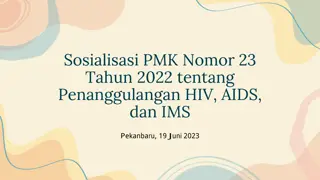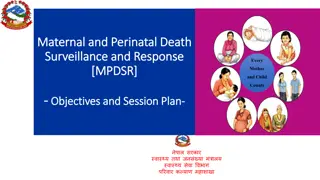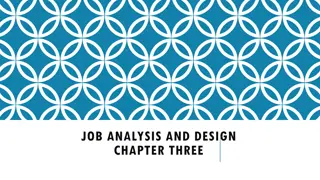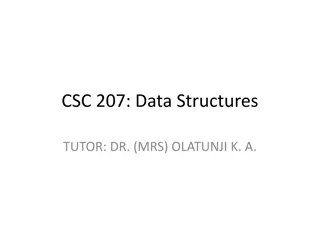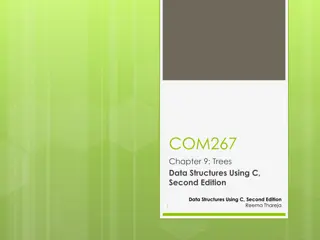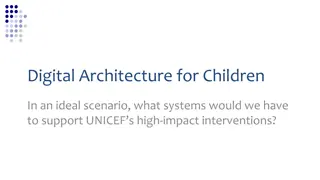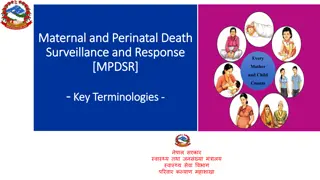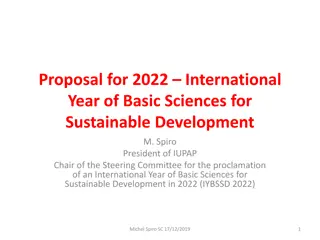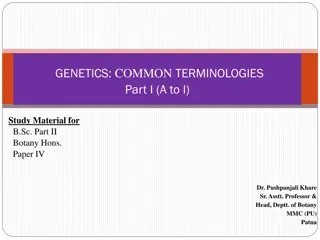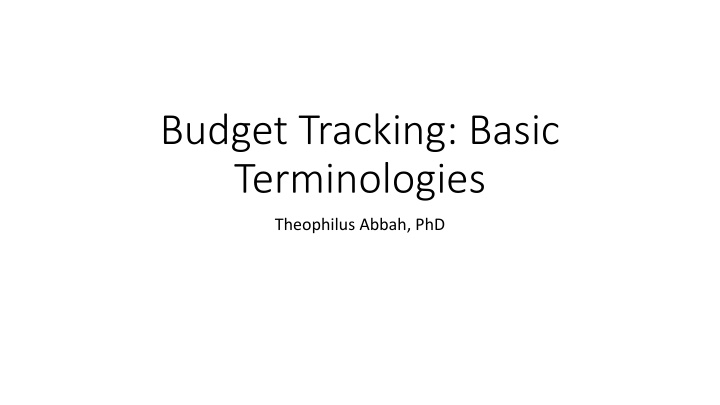
Budget Tracking and Economic Terms
Discover the basic terminologies related to budget tracking, including the Appropriation Bill, GDP, per capita income, overheads, personnel costs, and recurrent expenditure. Enhance your knowledge of financial concepts for better financial management.
Download Presentation

Please find below an Image/Link to download the presentation.
The content on the website is provided AS IS for your information and personal use only. It may not be sold, licensed, or shared on other websites without obtaining consent from the author. If you encounter any issues during the download, it is possible that the publisher has removed the file from their server.
You are allowed to download the files provided on this website for personal or commercial use, subject to the condition that they are used lawfully. All files are the property of their respective owners.
The content on the website is provided AS IS for your information and personal use only. It may not be sold, licensed, or shared on other websites without obtaining consent from the author.
E N D
Presentation Transcript
Budget Tracking: Basic Terminologies Theophilus Abbah, PhD
Appropriation Bill This is the comprehensive budget proposal sent by the president, governors or local government chairmen to the legislature for debate and approval. The legislature, representatives of the people, has the powers to approve revenue and expenditure for the executive. When the proposal is scrutinized by the legislature and approved, the president, governor or LG chairman signs it. The Bill transformed to Appropriation Act. When it becomes an Act, the budget becomes a law, which must be adhered to strictly. In some parts of the world, as soon as the budget is approved by the legislature and signed into law by the president, all the line items therein must be implemented.
Gross Domestic Product (GDP) This economic term refers to the total monetary value of goods and services produced in a country, state, or local government over a period, of say, one year or six months or a quarter of a year. In calculating the GDP, the outputs of all sectors of the economy are put together, to ascertain the total value of goods and services produced. In Nigeria, exports by oil and gas sector, ICT, agriculture, financial sector, etc, are put together to arrive at the GDP. In many cases, a country s GDP determines how it is rated economically among nations. It is expected that Nigeria s GDP will hit $424 billion in 2023.
Per capital income This is the total value of goods and services produced in a country, state or local government, divided by the population. For instance, as at 2022, Nigeria s per capital income was $2,502. Nigeria s GDP may be higher than South Africa s GDP, but SA s per capital income may be higher than Nigeria s. In 2022, SA s PCI was $6,694.36. South Africa s GDP in 2021 was $419.02.
Overheads In every budget, we hear the word overhead as part of recurrent expenditure. This has to do with expenses that must be incurred, like rent, water bill, electricity bills, fuelling of cars, telephone bills, newspapers, and the like. Usually, these eat deep into budgets, and may be a source of fraud for civil servants.
Personnel cost Personnel cost include salaries, allowances and other payments made to civil servants. Personnel cost is part of recurrent expenditure because they have to be paid at intervals, like every month or year, or whenever personnel had to travel for work...
Recurrent Expenditure It is called recurrent because they are incurred regularly on a daily or monthly basis. Funds must be available for them. Usually they are made up of personnel and overhead costs. Where recurrent expenditure is too high, there may be no funds available for expensive, long term projects.
Recurrent Capital Revenue These are loans, bonds, grants, etc which accrue to governments and which are deployed for capital projects. For instance, the World Bank, IMF, Paris Club, developed countries provide such funds, which are channeled into projects or used to prosecute expensive campaigns by government ministries, departments and agencies.
Capital/Development Expenditure This has to do with expenditure to fund developmental projects, like the construction of road, hospitals, water projects, educational projects, etc. Journalists must be mindful about such projects for inflation of contract sums, conflict of interest, phoney projects, ambitious but irrelevant ones, etc.
Revenues These are sources of income for government. In Nigeria, there are several sources: Oil and gas Non-Oil: VAT, Customs, FIRS, Corporate Income Tax, etc
Benchmark This is usually based on projections or expectations. Government may benchmark the price of crude oil at $70 per barrel, and calculate expected revenue from oil and gas on this. Nigeria exports 1.8 million barrels of crude oil per day. So its revenue would be $70 multiplied by 1.8 million, all things being equal.
Surplus Budget This is where the revenue of government exceeds the projected expenses. This happens when there is economic windfall, like when the prices of oil and gas in the international market rise; or when the people pay so much taxes on their income, beyond the government s projections when the budget was being prepared. In recent years, there has not been surplus budget in Nigeria.
Budget Deficit A country runs deficit budget when it has to borrow to fund its capital and recurrent expenditure. Such borrowings may be internal and external. Internal borrowings could be from pension fund, savings accounts, insurance firms, and bonds. External borrowings could be from foreign banks, like World Bank, IMF, Exim banks, Paris Club, bilateral arrangements, etc.
Balanced Budget This is where revenues and expenditure are the same, such that there is no surplus, and no deficit. Government with balanced budget does not need to borrow funds to execute its recurrent and capital expenditures.
Zero based budgetting This is the kind of budgeting that is based on priorities and justifications. It is not based on the conventional ways of budgeting, which is to look at the previous year s budget to determine the next budget. In many cases, we find the repeat of previous budgets in current budgets. Zero based budgetting disregards previous year s budget and demands that requests for expenditure must be justified by the government department.
Statutory Transfers These are priority payments, usually on first-line-charge. They must be funded, so government has to look for the money, even if it means borrowing. In Nigeria, National Assembly budget, UBEC, INEC, Judiciary, domestic debts, Basic Health budget, etc are statutory transfers that cannot be avoided.
Service Wide Votes In preparing budgets, government must make provision for emergencies, like Covid-19. There may be no budget for such emergencies but the funds could be raise from Service Wide Votes. Many government departments who are highly connected obtain funds from the system in the name of service wide votes.
Security Votes These are funds made available to the executive, especially the president and governors, to deal with security emergencies. Usually, it is not accounted for. It s usually a sum of money made available for spending which may not be retired, unlike overhead, personnel, and capital project costs.
Virement Virement has to do with using funds meant for one line item in a particular sector to fund another line item. For instance, if in the Ministry of Health there is money allocated for the purchase of cars, it is possible to convert them for the purchase of emergency drugs. But it is not allowed for virement to be across sector. Funds cannot be moved from the Ministry of Works to Ministry of Health.
Debt servicing Debt servicing has to do with interest paid of loans taken by government. It is different from debt repayment. If the debt servicing is too high, it could impede the implementation of development project. For instance, over 90 per cent of Nigeria s revenue goes into debt servicing.
Revised budget A budget is revised when revenue or expenditure are reduced in line with current realities. If the assumptions and projections were wrong, then the allocations to MDAs will be affected. It leads to a downward review of budgets. But if not, it could lead to upward review of budgets.
Supplementary budgets As the name implies, supplementary budgets are additional. The executive may take additional expenditure to the legislature for approval before spendings could commence.
Counterpart funding In carrying out projects, international bodies or even the FG could insist on counterpart funding. That means FG or World Bank brings a certain amount, while the loan applicant pays another percentage. This is applicable in UBEC funds which are not accessed by government. International organizations insist on counterpart fund as precondition for assessing the grantee s level of transparency and accountability.
Expenditure control Government has departments or officials who control expenditure to ensure they are in line with the budget. There are: Accountant-General Ministry of Finance control Appropriation committee of the legislature Budget committee Departmental control Treasury control


